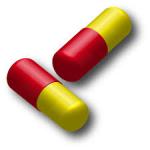Placebos work. Evidence from many sources shows that medically inert substances when enrobed in an appropriate presentation make us feel better.
placebo
Have you noticed that drug commercials always conclude with some ominous warning like, "This drug may cause headache, anxiety, vomiting, diarrhea, restlessness, and erectile dysfunction"?
Without a doubt, almost all alternative medicine is junk science.
Imagine your wife suffers a cardiac arrest in the middle of the night and remains unconscious. You start CPR and tell your granddaughter to call 911.
When a drug or treatment is tested for efficacy, there are two groups (at least) of people involved in the experiment. One group receives the actual drug or treatment (the experimental group).
Acetaminophen is recommended as a first-line treatment for acute lower back pain






